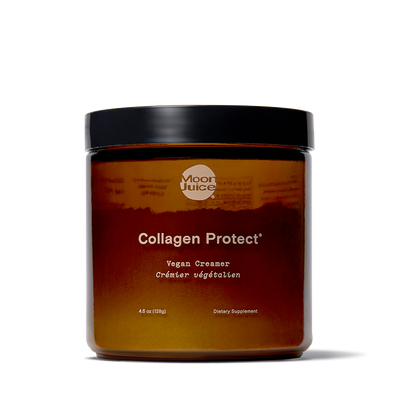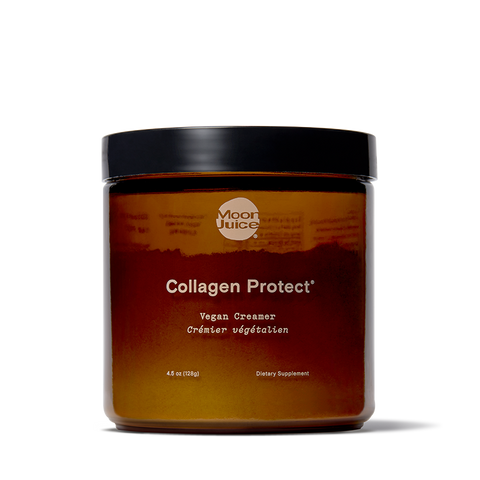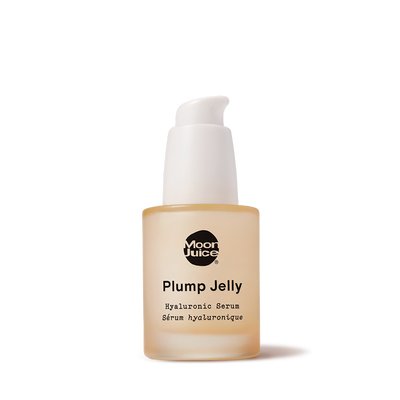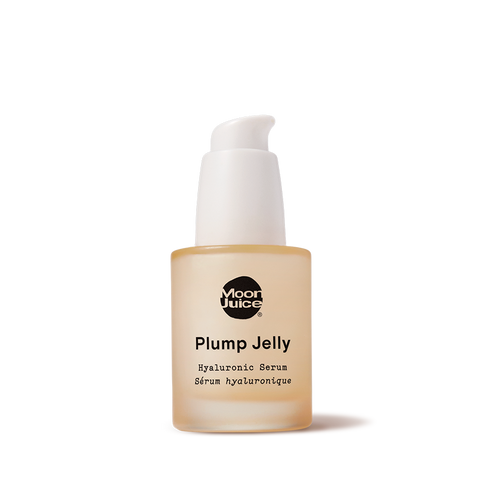Collagen is an essential protein that can be found in bones, muscles, tendons, and skin. Collagen, alongside elastin, is praised for encouraging healthy skin by helping shed dead skin cells and making way for new ones. However, despite the buzz collagen is getting in the beauty realm, its importance goes beyond plump skin. Collagen is a powerhouse, supporting the overall health and functionality of your skin, muscles, hair, nails, joints, and gut.
However, collagen loss is part of the natural aging process, alongside other factors that can affect its production. If you’ve ever had seasons of experiencing thinning, and sagging skin, lines, wrinkles, hair loss, stiff joints, muscle loss, or mysterious gut issues, it is possible your collagen level has taken a hit. Finding ways to stimulate collagen production in the skin is important for sustainable skin health and overall physical health.
From lifestyle changes and collagen-boosting foods to natural ingredients in skin care, you’ll find there are simple ways to begin increasing your collagen production to build and maintain resilient and healthy skin. Read on to discover how you can boost collagen production and the benefits of doing so.
The Benefits of Increasing Collagen Production
If you’ve wondered how to get plump skin, you’ve probably been told to stimulate collagen production. However, Increasing collagen production comes with many seen and unseen benefits. Studies show skin with high levels of collagen is stronger than skin that is low in collagen. Supplementing with collagen has been shown to make hair, nails, and skin appear healthier.
Increasing your body’s production of collagen can also address gut imbalances while allowing stiff joints to become more supple and tendons, ligaments, and muscles to become more flexible.
7 Ways to Stimulate Collagen Production
Surprisingly, your collagen can actually flux depending on a few variables in your lifestyle, like stress, sleep, sun exposure, inflammation, and nutrition. Environmental factors (like air pollution and blue light) also have the potential to stress the skin and make it appear dry, rough, and wrinkled, so stimulating collagen is essential to supply the skin with the hydration it needs. Here are 8 ways to start stimulating natural collagen production:
1. Start Supplementing
Because Collagen naturally breaks down with stress and time, collagen supplementation is an effective and efficient way to give your body the nutrients it needs to maintain skin health. Studies have shown that oral supplementation increases the elasticity, hydration, and strength of skin and encourages the body to preserve and produce more of it.
Not all collagen supplements can protect your natural collagen. Animal and marine peptides add collagen but don’t help you retain your innate supply. Collagen Protect® is a vegan collagen powder and skin supplement formulated with 3 ingredients and a complete amino acid profile that help protect, preserve, and build your collagen.*
2. Use Skin Care
There are a few skin care ingredients that have been shown to stimulate Collagen and increase hydration. We’ll dive into the specific ingredients later on, but overall, research has proved topical nutrients are effective in restoring natural collagen levels.
To support your skin from the inside out and outside in, combine a collagen supplement like Collagen Protect® with a Hyaluronic Acid serum like Plump Jelly to ensure your skin is able to lock in moisture and preserve elasticity.
3. Use Sunscreen
One of the most useful skin care tips you’ll hear, and should definitely listen to, is to use sunscreen daily. Why? Shockingly, UV rays have the potential to break down collagen and play a significant role in skin aging. To prevent the look of lines and wrinkles after sun exposure and retain collagen, use mineral sunscreen.
4. Engage in Exercise
Exercise defends the body against free radicals and lowers stress levels, helping to increase lymph flow and slow down visible signs of aging by maintaining collagen levels. Getting your body moving is also great for circulation and detoxification. By engaging in movement you can not only support your muscles but also brighten your mood and sharpen your cognition as well! However, exercise, if incorporated too much or too intensely, can overwhelm your body, add extra stress, and trigger a hormonal cascade. By consciously checking in with your body, you can determine what type of movement may be best for you.
5. Manage Stress
In the same way stress reflects itself through your physical health, it can reflect itself through skin health too. Managing stress can reduce inflammation and increase the body’s capacity to heal and recover, ultimately slowing down signs of accelerated aging (lines and wrinkles) by increasing collagen.
6. Get Good Quality Sleep
Shockingly, your collagen levels are dependent on your sleep quality. When your body is asleep, it recovers from daily stress and repairs and regenerates its cells, making restorative sleep a non-negotiable for skin health.
7. Use Food
Nutrient-dense foods can increase the health of our skin. Phytonutrient-rich foods provide the body with antioxidants to fight free radical damage and oxidative stress. The more you incorporate plant-based foods, the more you avoid collagen breakdown and stimulate its synthesis. To unstress your skin and ensure it can preserve its collagen levels further, avoid foods high in sugar, as they have been shown to increase skin inflammation and accelerate aging.
Foods to Add to Your Diet to Promote Collagen
Your body has the amazing ability of creating its own supply of collagen, so long as it has the building blocks of nutrients available in your diet. To promote natural collagen production through your diet, incorporate these 9 collagen boosting foods to increase its levels:
1. Aloe Vera
Aloe vera stimulates collagen production, whether used topically or orally.
2. Berries
Berries are rich in polyphenols, which reduce inflammation and help protect collagen reserves.
3. Carrots
Carrots contain the phytonutrient beta-carotene, which decreases the breakdown of collagen, minimizing the look of fine lines.
4. Cashews
Cashews contain the mineral Copper, which boosts the body’s ability to make collagen.
5. Citrus
The Vitamin C found in citrus fruits is not only important for a healthy diet, but imperative for collagen production since the body cannot create Vitamin C on its own and depends on this nutrient through food sources.
6. Fermented Foods
Fermented foods like tofu, tempeh, and kimchi contain the antioxidant-rich bacteria Lactobacillus, which prevents collagen breakdown.
7. Ginseng
Ginseng is full of phytonutrients, especially polyphenols which can reduce occasional inflammation and help the skin maintain its collagen supply.
8. Mushrooms
Mushrooms contain proline, an amino acid necessary for collagen production.
9. Seaweed
Seaweed contains Vitamin E and Beta-Carotene, which increases hydration and decreases collagen breakdown.
Natural Ingredients that Stimulate Collagen Production
When it comes to skin care, there are 4 major ingredients that have been research-proven to support collagen synthesis and preservation:
1. Hyaluronic Acid
If you ask how to hydrate skin, Hyaluronic acid will be one of the top answers you’ll hear. However,
not only can Hyaluronic Acid help skin cells to retain their moisture and make skin appear more hydrated, it can support collagen production and reduce the appearance of fine lines.
This ingredient can be found in many skin care products, from cleansers to serums and moisturizers.
2. Silver Ear Mushroom
Silver Ear Mushroom can support the skin barrier and encourage deep skin hydration. Studies have found that dehydrated skin causes the length of collagen proteins to shrink and become damaged, making hydration a necessity to stimulate and maintain collagen.
3. Vitamin C
Vitamin C is a powerful antioxidant that plays two roles when it comes to collagen, it supports the body in stabilizing collagen and determines how much collagen the body can produce. The body cannot create Vitamin C so incorporating it as an ingredient in your diet and skin care is important to nourish collagen levels.
4. Vitamin E
Vitamin E is an essential fatty acid with antioxidative properties that prevents visible signs of aging by its ability to protect collagen.
Collagen Protect® is skin care you can drink. This vegan collagen powder supplement is formulated with Hyaluronic Acid, Silver Ear Mushroom, and Tocos, and can be added to coffee or smoothies. To preserve collagen and hydrate from the outside in with the same three ingredients, add Plump Jelly to your skin care routine.
Sign Up, Nerd Out
Get wellness tips, education, and recipes
delivered straight to your inbox.
Get wellness tips, education,
and recipes delivered
straight to your inbox.
Takeaways
Collagen is a powerhouse protein that is essential for skin health and hydration but breaks down naturally with stress and time. There are a handful of benefits that come from stimulating collagen production, so when you're ready to minimize fine lines and hydrate skin, you can consider a few options — you can make changes to your lifestyle, consume collagen-boosting foods, and incorporate collagen-friendly natural ingredients into your diet and skin-care.
Sources
- National Library of Medicine, A Collagen Supplement Improves Skin Hydration, Elasticity, Roughness, and Density: Results of a Randomized, Placebo-Controlled, Blind Study https://www.ncbi.nlm.nih.gov/pmc/articles/PMC6835901/
- National Library of Medicine, Oral Collagen Supplementation: A Systematic Review of Dermatological Applications https://pubmed.ncbi.nlm.nih.gov/30681787/
- National Library of Medicine, Collagen hydrolysate intake increases skin collagen expression and suppresses matrix metalloproteinase 2 activity https://pubmed.ncbi.nlm.nih.gov/21480801/
- National Library of Medicine, Age-Associated Skin Conditions and Diseases: Current Perspectives and Future Options https://pubmed.ncbi.nlm.nih.gov/26994263/
- National Library of Medicine, Skin anti-aging strategies https://www.ncbi.nlm.nih.gov/pmc/articles/PMC3583892/
- National Library of Medicine, Effect of estrogens on skin aging and the potential role of SERMs https://www.ncbi.nlm.nih.gov/pmc/articles/PMC2685269/
- National Library of Medicine, Nutrition and aging skin: sugar and glycation https://pubmed.ncbi.nlm.nih.gov/20620757/
- Wiley Online Library, Prospective, randomized, double-blind assessment of topical bakuchiol and retinol for facial photoageing https://onlinelibrary.wiley.com/doi/full/10.1111/bjd.16918
- National Library of Medicine, Brain-Skin Connection: Stress, Inflammation and Skin Aging https://www.ncbi.nlm.nih.gov/pmc/articles/PMC4082169/
- National Library of Medicine, Skin barrier immunity and ageing https://www.ncbi.nlm.nih.gov/pmc/articles/PMC7218662/
- National Library of Medicine, Aloe Vera: A Short Review https://www.ncbi.nlm.nih.gov/pmc/articles/PMC2763764/
- National Library of Medicine, Discovering the link between nutrition and skin aging https://www.ncbi.nlm.nih.gov/pmc/articles/PMC3583891/
- National Library of Medicine, Immunity boosting roles of biofunctional compounds available in aquafoods: A review https://www.ncbi.nlm.nih.gov/pmc/articles/PMC9160354/
- National Library of Medicine, Proline-dependent regulation of collagen metabolism https://www.ncbi.nlm.nih.gov/pmc/articles/PMC7228914/
- National Library of Medicine, The effect of oral collagen peptide supplementation on skin moisture and the dermal collagen network: evidence from an ex vivo model and randomized, placebo-controlled clinical trials https://pubmed.ncbi.nlm.nih.gov/26362110/
- National Library of Medicine, Antioxidant properties of methanolic extracts from several ear mushrooms https://pubmed.ncbi.nlm.nih.gov/11714344/
- National Library of Medicine, Vitamin C-squalene bioconjugate promotes epidermal thickening and collagen production in human skin https://pubmed.ncbi.nlm.nih.gov/33037252/
- The role of vitamin E in normal and damaged skin https://pubmed.ncbi.nlm.nih.gov/7633944/
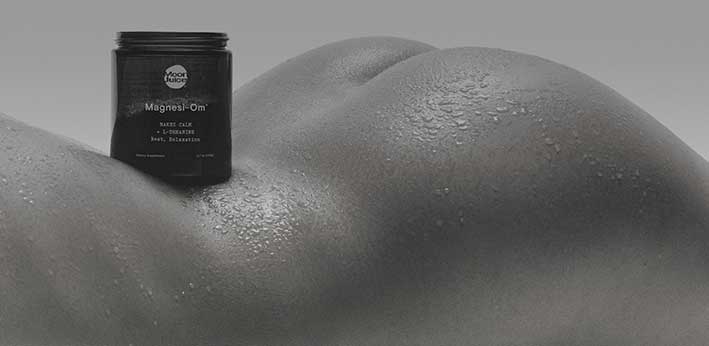
-(1).png?v=1684924659829)
-(1).png?v=1684924682763)
